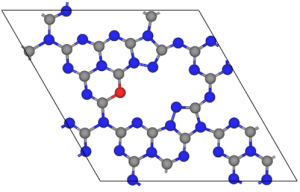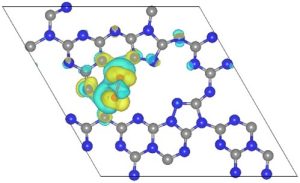- Book Review Published on the LSE Review of Books Website February 22, 2023
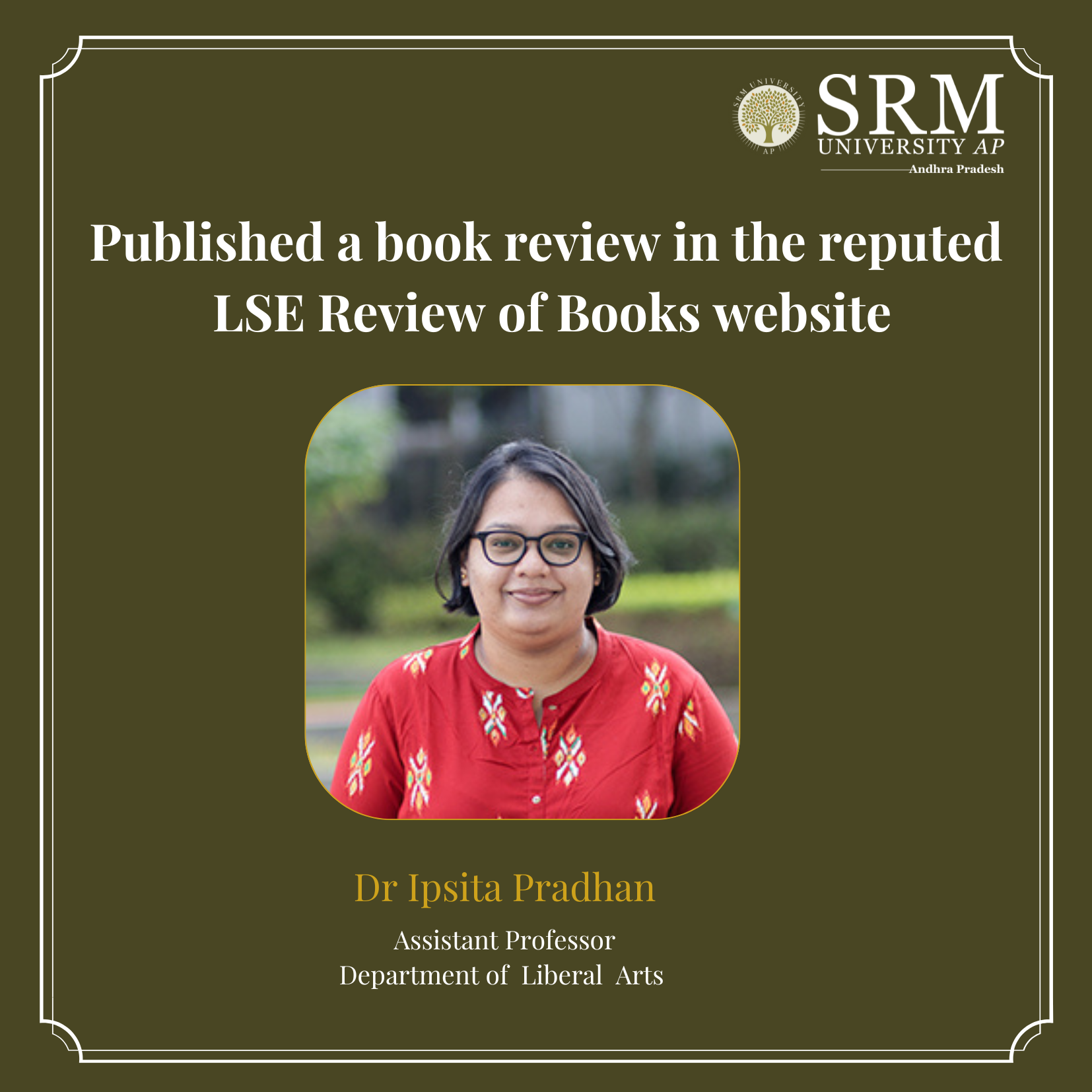 Assistant Professor Dr Ipsita Pradhan, Department of Liberal Arts, has recently published a book review on the renowned LSE Review of Books website. In her recent review, Dr Pradhan offers insightful perspectives on the book Confidence Culture by Shani Orgad and Rosalind Gill. This crucially important book appeals to media studies, American studies, and feminist scholars, as well as a wide public audience.
Assistant Professor Dr Ipsita Pradhan, Department of Liberal Arts, has recently published a book review on the renowned LSE Review of Books website. In her recent review, Dr Pradhan offers insightful perspectives on the book Confidence Culture by Shani Orgad and Rosalind Gill. This crucially important book appeals to media studies, American studies, and feminist scholars, as well as a wide public audience.Dr Ipsita Pradhan elaborates on how the book assures that self-love affirmations in contemporary times are not free from the disciplinarian gaze of the market and its neoliberal capitalist mechanisms, as it is often measured through one’s productivity. She commends the authors’ rigorous research and compelling arguments, stating that the book offers a much-needed critique of the prevailing cultural narrative around confidence.
“In Confidence Culture, Shani Orgad and Rosalind Gill explore the demands that the cultural imperative of confidence particularly places on women. Enriched by abundant examples drawn from across popular culture to show how ‘confidence culture’ puts the onus on individuals to navigate and solve systemic problems, this book is necessary reading for scholars of gender, media studies and sociology”, writes Dr Ipsita Pradhan.
LSE Review of Books publishes daily reviews of academic books across the social sciences. It aims to facilitate the sharing and exchange of knowledge between experts within and outside the academy and to open up academic research to increase its impact. LSE Review of Books is a forum to encourage engagement with the latest academic publications across the social sciences and the humanities.
Click to read the full book review!
Continue reading → - Boosting Transitive Communication in Large-scale IoT Networks February 21, 2023
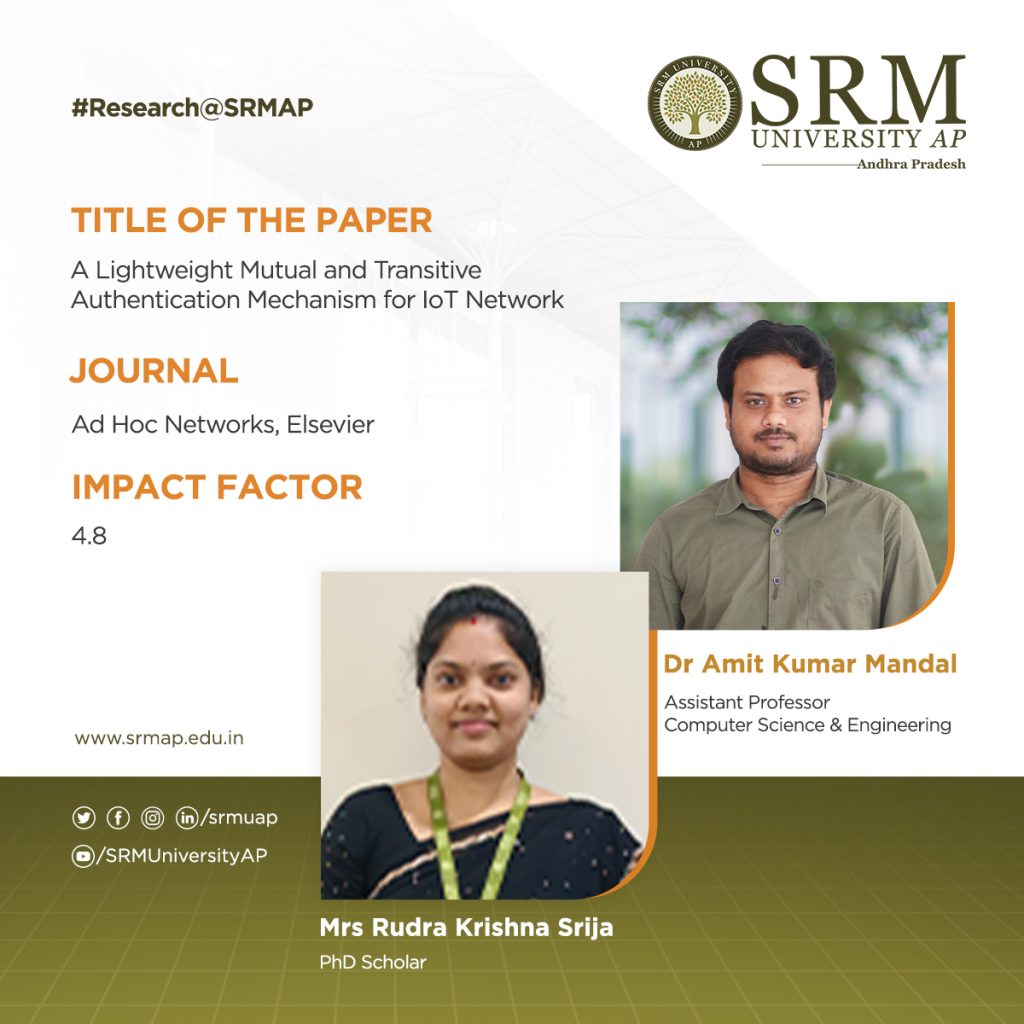
Complex IoT networks comprise multiple devices connected to the gateway. A smoother functioning is ensured through new techniques for device authentication to the gateway. On this note, the research paper titled “A Lightweight Mutual and Transitive Authentication Mechanism for IoT Network” has been published by Dr Amit Kumar Mandal, Assistant Professor, Department of Computer Science and Engineering and his research scholar Mrs Rudra Krishna Srija in the Q1 Journal Ad Hoc Networks, Elsevier having an impact factor of 4.8. The research details the use of the polynomial-based protocol in enhancing device connection for transitive communication.
Abstract of the paper
In large and complex IoT systems like the smart city or smart industry which consist of thousands of connected devices, it may not always be feasible to be directly connected to the gateway but it may be possible to be connected to another device. Therefore, already authenticated devices should facilitate the new device’s authentication by the gateway. To address this issue, the existing protocols use multiple authentication protocols based on different cryptography techniques, which are difficult to implement and manage in resource-constrained IoT devices. In this paper, we propose a Transitive device authentication protocol based on the Chebyshev polynomial.
The work is primarily aimed at improving transitive communication in machine-to-machine communication or device-to-device communication in large-scale heterogeneous IoT network scenarios. The research team targets to investigate the benefits of adopting the designed protocol in particular within low-power and lossy networks in the future.
Collaborations
Università Ca Foscari Venezia, Venice, Italy
Continue reading → - Synergistic Effects of CN in Sonophotocatalytic Degradation February 21, 2023
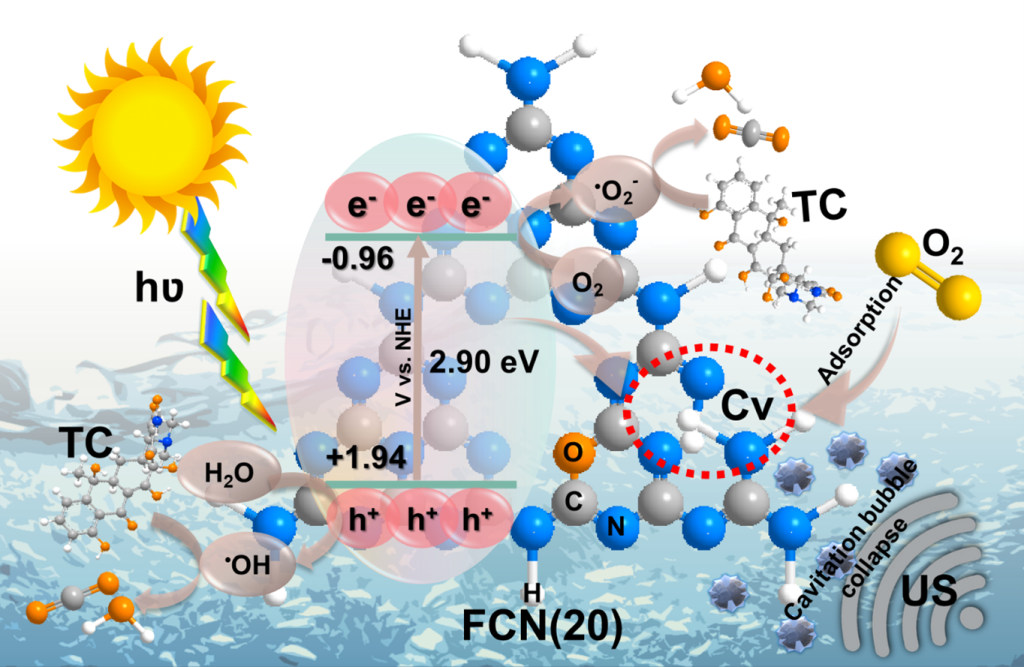
The Department of Physics is pleased to announce that Professor Ranjit Thapa, Dean-School of Engineering and Sciences (SEAS) and Professor of Physics along with his PhD scholar, Mr E S Erakulan, has published a groundbreaking paper titled “Scrutinizing the Role of Tunable Carbon Vacancies in g-C3N4 Nanosheets for Efficient Sonophotocatalytic Degradation of Tetracycline in Diverse Water Matrices: Experimental study and theoretical calculation” in the prestigious Chemical Engineering Journal with an impact factor of 16.744. The paper offers crucial insights into the role of controllable defects in the sonophotocatalytic degradation of tetracycline (TC) antibiotics from polluted water.
Abstract of the paper
Metal-free polymeric graphitic carbon nitride (CN) materials are robust and stable visible-light-driven photocatalysts that have recently piqued interest in photocatalytic applications. Its photocatalytic performance is restricted remarkably due to moderate oxidation ability and fast charge carrier recombination rate. To address these issues, we engineered carbon-vacant CN (FCN) using a facile formalin-assisted thermal polymerization of molten CN precursor in which the carbon vacancies (C v ) were regulated by altering formalin dosage. Consequently, FCN catalysts revealed C v concentration-dependent sonophotocatalytic degradation of Tetracycline (TC) antibiotics over diverse water matrices. The optimal FCN exhibited complete TC degradation efficiency within 60 min with a synergy index of 1.4, which is approximately 2.6 times higher than that of pristine CN. The enhanced sonophotocatalytic performance was mainly due to the synergistic effect of ultrasound and light irradiation. The C v formation also resulted in enhanced charge carrier transportation and facilitated oxygen adsorption at the C V site of FCN – supported by both experimental study and theoretical calculation. Subsequently, FCN generated abundant reactive active oxygen species including, •O 2 –, as well as indirectly •OH which played a significant role in the degradation pathway and mineralisation of the TC molecules. This study provides insight into understanding the correlation between controllable defects and sonophotocatalytic degradation properties of the self-doped and deficient FCN.
In this research, Prof. Thapa and his team utilised a facile formalin-assisted thermal polymerization technique to fabricate metal-free polymeric graphitic carbon nitride (CN) materials. These materials have been gaining increasing interest as photocatalysts, although their photocatalytic performance has been restricted due to moderate oxidation ability and fast charge carrier recombination rate. To address these issues, the researchers engineered carbon-vacant CN (FCN) by regulating carbon vacancies (Cv) with formalin dosage. The optimal FCN catalyst exhibited complete TC degradation within 60 minutes with a synergy index of 1.4, which is approximately 2.6 times higher than pristine CN.
Emerging pollutants, such as antibiotics discharged from pharmaceutical companies, have detrimental effects on living organisms and can cause drug resistance through gene transmission. The removal of TC from water requires efficient and sustainable strategies. A detailed understanding of the synergistic effects of the defect and self-doped CN in sonophotocatalytic degradation could pave the way for the destruction of various recalcitrant pollutants in an aqueous environment.
Collaborations
- Ms Mani Preeyanghaa, Department of Physics and Nanotechnology, SRM Institute of Science and Technology, Kattankulathur, Chennai.
- Prof. Bernaurdshaw Neppolian, Department of Physics and Nanotechnology, SRM Institute of Science and Technology, Kattankulathur, Chennai.
Overall, the research presents exciting possibilities for future projects in the field of sonophotocatalytic degradation and provides a significant contribution to the scientific community’s understanding of controllable defects in CN materials.
Continue reading → - Reshaping the world: Dr M Mallikarjuna Rao Establishes Novel Start-up Venture February 20, 2023
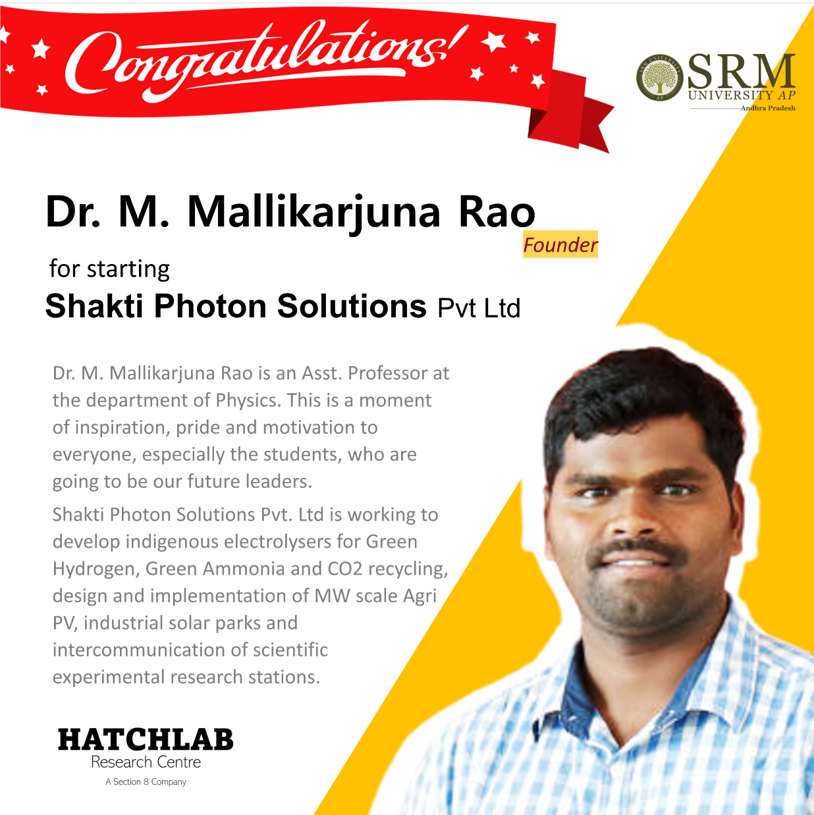
SRM University-AP manifests a supportive ecosystem for entrepreneurial ventures and start-ups with high potential from our ingenious students and faculty. The most recent faculty-led venture accomplishment was by Dr M Mallikarjuna Rao, Assistant Professor, Department of Physics who has established his very own start-up enterprise, Shakti Photon Solutions Pvt Ltd. The Hatchlab Research Centre and the Directorate of Innovation and Entrepreneurship had imparted unrelenting support to Dr Rao in materialising his inventive idea into actuality.
Shakti Photon Solutions Pvt. Ltd aims to develop Indigenous electrolysers for Green Hydrogen, Green Ammonia and CO2 recycling, Design and implement MW scale Agri PV, Industrial solar parks and Intercommunication of scientific experimental research stations. The venture has successfully completed the prototype phase and is ready for commercialisation and production.
Kudos to our faculty champions for their effort and dedication to great ventures with huge potential and for inspiring budding entrepreneurs to achieve success!
Continue reading → - SRM University-AP Ranked India’s Third Best Private University in Nature Index Ranking February 20, 2023
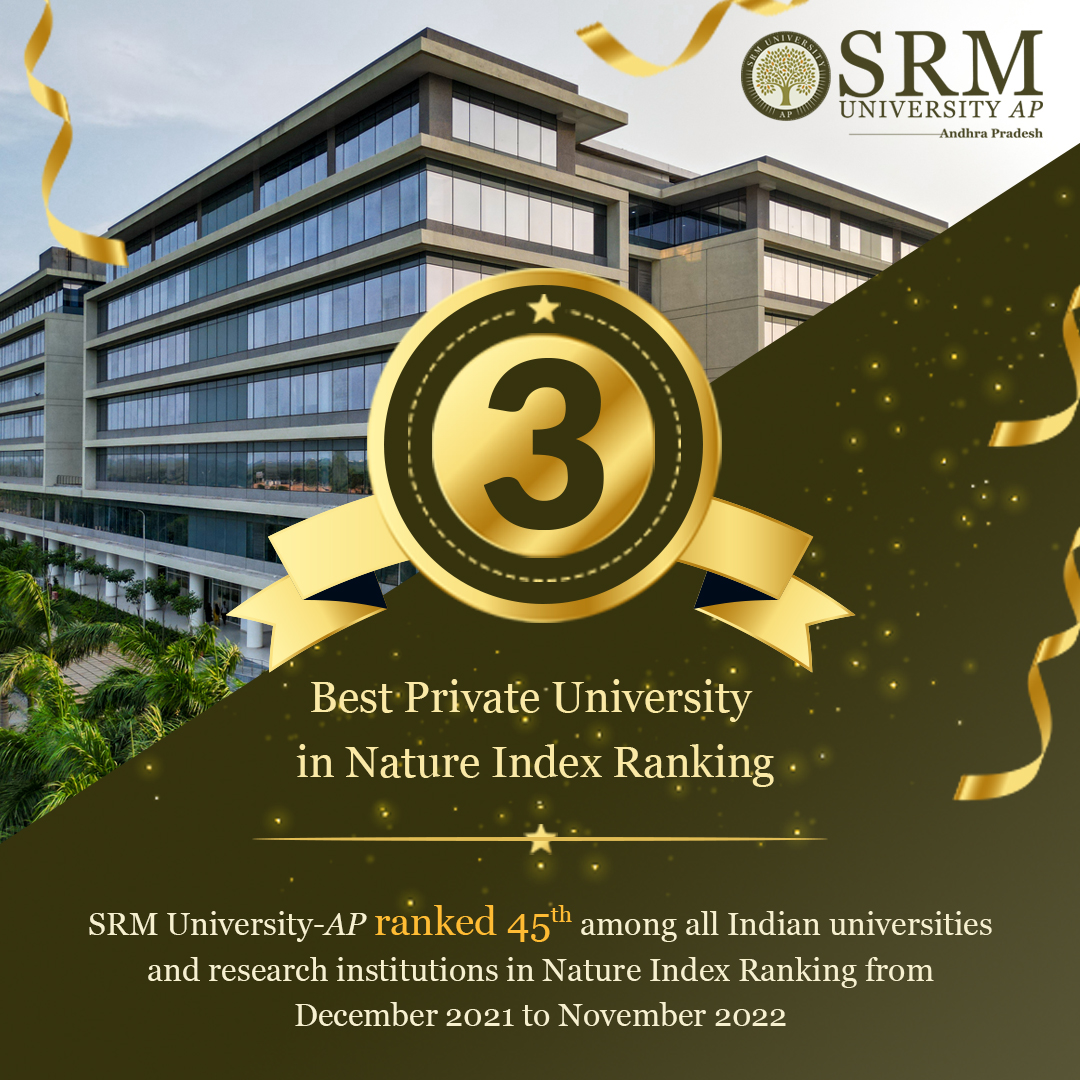 The Nature Index Publications rankings for the previous year are out, and SRM University-AP ranks 3rd among all the private universities in India. The five-year-old university stands 45th among all universities and research institutions in India. With 11 quality research publications, the university stood on top of the rankings from December 2021 to November 2022. Prof. Ranjit Thapa, Dr Shoji Thottathil, Dr Mahesh Ravva, Dr Amit Chakraborty, Dr Pankaj Bhalla, and Dr Nimai Mishra of SRM University-AP are the faculty who contributed to this incredible achievement through their high-quality research endeavours.
The Nature Index Publications rankings for the previous year are out, and SRM University-AP ranks 3rd among all the private universities in India. The five-year-old university stands 45th among all universities and research institutions in India. With 11 quality research publications, the university stood on top of the rankings from December 2021 to November 2022. Prof. Ranjit Thapa, Dr Shoji Thottathil, Dr Mahesh Ravva, Dr Amit Chakraborty, Dr Pankaj Bhalla, and Dr Nimai Mishra of SRM University-AP are the faculty who contributed to this incredible achievement through their high-quality research endeavours.Dr P Sathyanarayanan, Pro-Chancellor of SRM University-AP, extended his heartiest congratulations to the faculty members, research scholars and administrators. “Once again, SRM AP proved how it is bound to be one of the best research-oriented universities in India”, added Prof. Manoj K Arora, Vice Chancellor of SRM AP. “SRM University-AP is making great efforts to strengthen its research facilities significantly and is poised to become the No.1 private university in nature index publications ranking a few years from now”, said Prof. D Narayana Rao, Pro-Vice-Chancellor of SRM AP.
The Nature Index tracks the affiliations of universities and research article contributions in a selected group of 82 high-profile scientific journals chosen by an independent panel of expert research scientists in different fields. Ranking criteria involve counting the number of published research articles by institutions in renowned publishing groups. The Nature Index provides absolute Count and fractional Share counts of article publications at the institutional and national levels and, as such, is an indicator of global high-quality research output and collaborations. SRM AP has a count of 11 publications, and the share of SRM AP is 4.16.
Each year, Nature Index ranks the leading institutions, which can be companies, universities, government agencies, research institutes, NGOs, and countries, by the number of scientific articles and papers published in leading journals. The ranking involves research fields, such as life sciences, chemical sciences, physical sciences, and earth sciences. The Index helps assess research excellence by institutions, regions, and research disciplines.
Continue reading →


